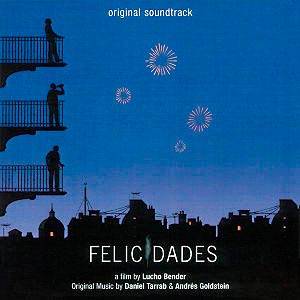Felicidades
Music composed by Daniel Tarrab and Andres Goldstein
Performed by Unnamed Ensemble
Available on Mellowdrama Records (MEL-106)
Running Time: 30:55
Available on iTunes. (Reviewed from a promotional CD.) [ED: My thanks to Daniel Tarrab for providing both the CD and DVD that made this review possible. -MM]

See also:
Deuda - Also Received Column (April 06 ed.): La Puta y La Ballena Some Who Lived Felicidades (2000) is a film I saw not long after the victory at the 2006 Oscars of Paul Haggis’ Crash (2005). I was no fan of Haggis’ film – I only caught up with it on DVD, and in that medium it seemed like a dumbed-down version of one of Michael Mann’s sublime Los Angeles-set films (Collateral, Heat), with the lack of character depth but none of the stylistic strength of Paul Thomas Anderson’s Magnolia. (To even compare it to Robert Altman’s sprawling ensemble pieces, as many have done, just feels impossible.)
Why do I mention this? Because, despite the fact that it was made five years ago, if I didn’t know better, and if this film had been made in English, I’d assume Felicidades was a send-up of Crash. It plays the sprawling geographical ensemble film (also recently featured earnestly in Stephen Gaghan’s Syriana) for comedy, reminiscent in a strange way of a 1999 film I’ve never forgotten called Cabaret Balkan, but here the emphasis is feel-good we-are-one-isms, far from the biting power of Goran Paskaljevic’s satiric classic. When a film climaxes with a montage on Christmas Eve set to ‘Silent Night’, it’s not really my sort of film.
The score, by Daniel Tarrab and Andres Goldstein, works well to support the film’s unambitious dramatic intentions. It’s not funny music so much as amiable music. ‘Soy un Angelitos / Titulos’ recalls the solo boy vocals in Bruno Coulais’ score for Les Choristes. The twice-included ‘Tema de Felicidades’ is a simple-but-uplifting theme with percussion, choir, children’s voices, and Celtic pipes – a kind of anthem for mankind on Christmas Eve. (It reminds me of, though isn’t quite as good as, Alejandro Amenebar’s celebratory end title music from The Sea Inside.) ‘Tango’ features the bandoneon leading a tango, a reminder of the composers’ career-best work in Luis Puenzo’s La Puta y La Ballena. There are also hints of the beautiful ‘Main Title’ theme from that film in the melancholy piano of ‘Confessiones del viejo’. The guitar-led ‘Vals Peruano’ is a nice but remarkably short waltz for guitar that sadly seems over before it begins.
This is not a bad candidate for an internet-only release though, if only because there are some tracks here that really don’t deliver dramatically away from the film at all. The Spanish reading of ‘I Will Survive’ is funny enough in the film, but here feels like an effort to draw out the running time of the score. The same goes for ‘Silent Night’, with Goldstein and Tarrab orchestrating the yuletide classic – there’s nothing in Etta James vocal that merits its especial inclusion here. And not all the underscore is great either – the synthesized drones of ‘Que Son’, ‘Paredon’ and ‘Contestador Silke’ are simply not developed enough to be musically interesting. Of the tracks written in this style, ‘Planta’ and ‘Hospital’ are slightly more interesting, but both are too short to really go places.
In all, it’s a disappointing album. But then it’s not a film that really granted the same license to the composers as their collaborations with Luis Puenzo did, and hopefully future projects will tap those depths heard in Some Who Lived and La Puta y La Ballena. Mellowdrama was wise to issue this as an iTunes release – it’s not on the same level as their other superlative titles to date, and the highlight tracks can be easily purchased this way by fans of the composers.
Michael McLennan
Rating:
2
Return to Reviews Index